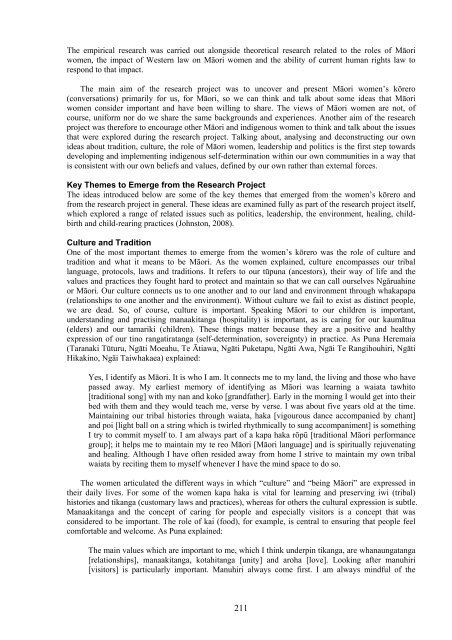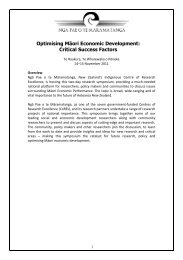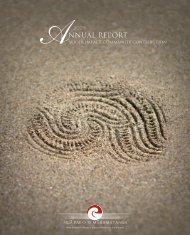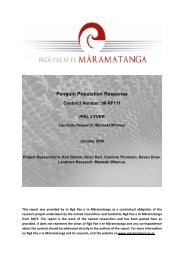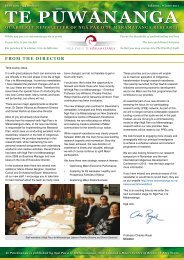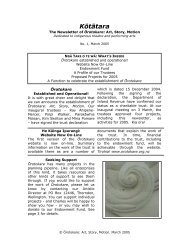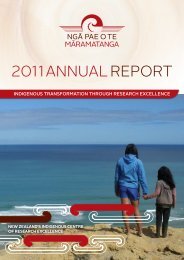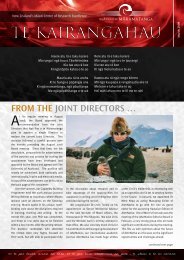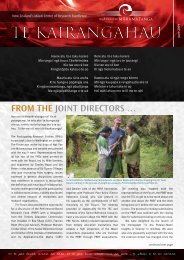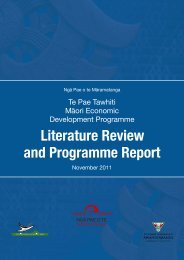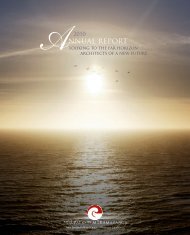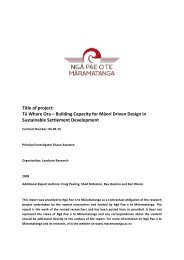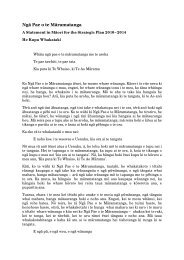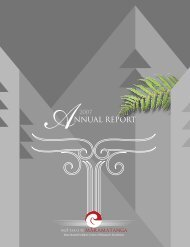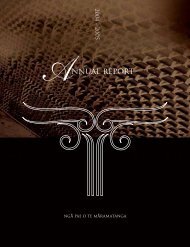traditional knowledge conference 2008 te tatau pounamu
traditional knowledge conference 2008 te tatau pounamu
traditional knowledge conference 2008 te tatau pounamu
Create successful ePaper yourself
Turn your PDF publications into a flip-book with our unique Google optimized e-Paper software.
The empirical research was carried out alongside theoretical research rela<strong>te</strong>d to the roles of Māoriwomen, the impact of Wes<strong>te</strong>rn law on Māori women and the ability of current human rights law torespond to that impact.The main aim of the research project was to uncover and present Māori women’s kōrero(conversations) primarily for us, for Māori, so we can think and talk about some ideas that Māoriwomen consider important and have been willing to share. The views of Māori women are not, ofcourse, uniform nor do we share the same backgrounds and experiences. Another aim of the researchproject was therefore to encourage other Māori and indigenous women to think and talk about the issuesthat were explored during the research project. Talking about, analysing and deconstructing our ownideas about tradition, culture, the role of Māori women, leadership and politics is the first s<strong>te</strong>p towardsdeveloping and implementing indigenous self-de<strong>te</strong>rmination within our own communities in a way thatis consis<strong>te</strong>nt with our own beliefs and values, defined by our own rather than ex<strong>te</strong>rnal forces.Key Themes to Emerge from the Research ProjectThe ideas introduced below are some of the key themes that emerged from the women’s kōrero andfrom the research project in general. These ideas are examined fully as part of the research project itself,which explored a range of rela<strong>te</strong>d issues such as politics, leadership, the environment, healing, childbirthand child-rearing practices (Johnston, <strong>2008</strong>).Culture and TraditionOne of the most important themes to emerge from the women’s kōrero was the role of culture andtradition and what it means to be Māori. As the women explained, culture encompasses our triballanguage, protocols, laws and traditions. It refers to our tūpuna (ancestors), their way of life and thevalues and practices they fought hard to pro<strong>te</strong>ct and maintain so that we can call ourselves Ngāruahineor Māori. Our culture connects us to one another and to our land and environment through whakapapa(relationships to one another and the environment). Without culture we fail to exist as distinct people,we are dead. So, of course, culture is important. Speaking Māori to our children is important,understanding and practising manaakitanga (hospitality) is important, as is caring for our kaumātua(elders) and our tamariki (children). These things mat<strong>te</strong>r because they are a positive and healthyexpression of our tino rangatiratanga (self-de<strong>te</strong>rmination, sovereignty) in practice. As Puna Heremaia(Taranaki Tūturu, Ngāti Moeahu, Te Ātiawa, Ngāti Puketapu, Ngāti Awa, Ngāi Te Rangihouhiri, NgātiHikakino, Ngāi Taiwhakaea) explained:Yes, I identify as Māori. It is who I am. It connects me to my land, the living and those who havepassed away. My earliest memory of identifying as Māori was learning a waiata tawhito[<strong>traditional</strong> song] with my nan and koko [grandfather]. Early in the morning I would get into theirbed with them and they would <strong>te</strong>ach me, verse by verse. I was about five years old at the time.Maintaining our tribal histories through waiata, haka [vigourous dance accompanied by chant]and poi [light ball on a string which is twirled rhythmically to sung accompaniment] is somethingI try to commit myself to. I am always part of a kapa haka rōpū [<strong>traditional</strong> Māori performancegroup]; it helps me to maintain my <strong>te</strong> reo Māori [Māori language] and is spiritually rejuvenatingand healing. Although I have of<strong>te</strong>n resided away from home I strive to maintain my own tribalwaiata by reciting them to myself whenever I have the mind space to do so.The women articula<strong>te</strong>d the different ways in which “culture” and “being Māori” are expressed intheir daily lives. For some of the women kapa haka is vital for learning and preserving iwi (tribal)histories and tikanga (customary laws and practices), whereas for others the cultural expression is subtle.Manaakitanga and the concept of caring for people and especially visitors is a concept that wasconsidered to be important. The role of kai (food), for example, is central to ensuring that people feelcomfortable and welcome. As Puna explained:The main values which are important to me, which I think underpin tikanga, are whanaungatanga[relationships], manaakitanga, kotahitanga [unity] and aroha [love]. Looking af<strong>te</strong>r manuhiri[visitors] is particularly important. Manuhiri always come first. I am always mindful of the211


